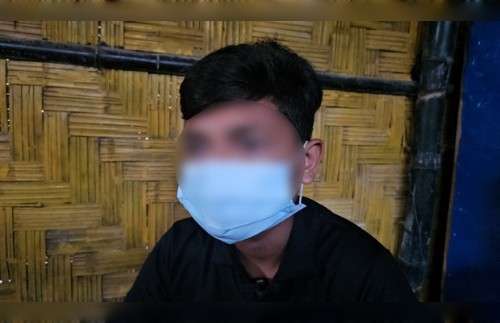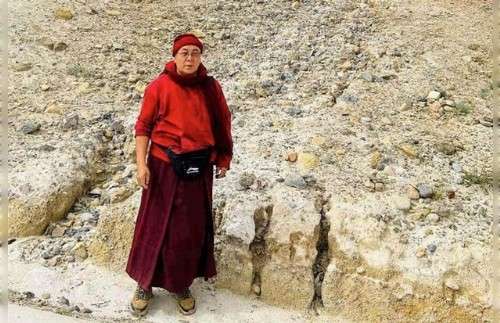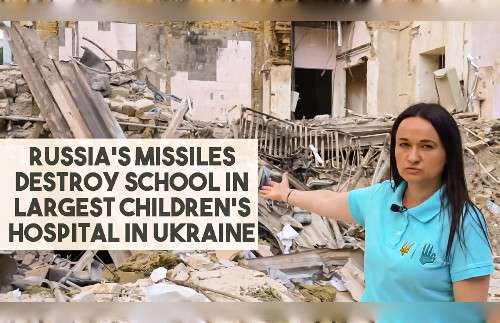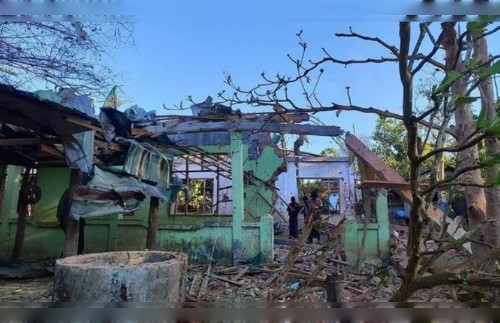Freshta Jalalzai and Ron Synovitz

Salema Akhundzada was speaking with her mother on the night of May 3 about making a dress as an end-of-Ramadan gift for her 6-month-old niece when a bomb exploded outside their mud-brick home in the eastern part of Ghazni Province.
Afghan government forces with close air support had launched a raid to search for Taliban fighters in Salema’s village of Niaz Baba — a remote settlement in an area that has, for years, been a transit point for militants who cross back and forth between Afghanistan and Pakistan’s South Waziristan tribal region.
Salema told RFE/RL that she remembers a flash “like lightning” and the shock of the blast from what she thinks was an air strike as the door flew inward and a piece of metal slashed through the left side of her face.
“I was just numbed when the explosion happened,” said the teenager, who remained unconscious until the next morning. “When I came to my senses, I looked for my mother and found my brother. Then I thought about myself and that’s when I began to feel the pain on my face.”
I was just numbed when the explosion happened,” said the teenager, who remained unconscious until the next morning. “When I came to my senses, I looked for my mother and found my brother. Then I thought about myself and that’s when I began to feel the pain on my face.”
“Nazo, Salema’s mother, says Afghan troops rushed to what was left of their house shortly after the explosion and demanded that she tell them where Taliban fighters were hiding.
She says she crumpled to the ground sobbing and explained she was just a poor widow with four children.
“God help me, can’t you see that my daughter is injured?” she says she told the soldiers, pointing toward the unconscious Salema.
Nazo says the soldiers left when they saw Salema lying in the pool of blood that was streaming from her disfigured face.
As Salema lay bleeding through the night in a corner of the one room of the house that had not been demolished, Nazo says she could hear gunfire from the ongoing raid.
Afghan government spokesman Arif Noori says five civilians and 15 Taliban fighters were killed during the raid — including a suspected Taliban bomb maker named Mousa.
Villagers say the government troops also took away five young men from Niaz Baba during the night.
Evacuation
The next day, when soldiers returned with an ambulance for Salema, the bodies of at least 11 slain villagers lay scattered across Niaz Baba.
Survivors still in shock from the violence were trying to round up wandering sheep and donkeys that were on the loose, and checking to see which of their neighbors were killed.
Nazo noted with despair that there was nothing left for her family in the village, where they’d been living on a combined income of less than $1 a day.
Nazo’s husband was killed in 2007 by a Taliban roadside bomb that also left her crippled with shrapnel embedded in her left leg.
In 2012, Salema’s older brother was severely beaten by Taliban who disapproved of him playing cricket. He died from his injuries several weeks later at the age of 18.
Then Salema’s uncle kicked them out of the home where they’d been staying.
Nazo’s children made their own mud bricks and gathered timber to build their tiny house. They only completed the work in 2017. Now, the house is uninhabitable.
The beans and wheat that Salema, her 15-year-old brother, and her two younger sisters had planted on a small plot of land earlier in the year were obliterated.
“Salema is a girl. You know what that means for her future here in Afghanistan. But I am happy she is not dead.”– Nazo Akhundzada
Even the chickens and pregnant cow they’d relied upon for sustenance had escaped.
“When this war ends, I will sigh, sit down, and count my scars,” Nazo told RFE/RL
“Even the chickens and pregnant cow they’d relied upon for sustenance had escaped.
“When this war ends, I will sigh, sit down, and count my scars,” Nazo told RFE/RL
“Only then will I pause to see how many of my relatives are still alive and to count how many have been killed,” said Nazo, who was orphaned herself as a young girl in 1983 when troops from Afghanistan’s communist government killed her widowed father and her brother in a raid against mujahedin fighters.
Nazo got into the ambulance to accompany Salema to the closest functioning medical facility — a clinic in Ghazni’s provincial capital where the government still holds sway.
In better days, the drive would have taken about 20 minutes.
But the gravel road linking the city to Niaz Baba and the town of Urgun further to the south in neighboring Paktika Province has been heavily damaged by a Taliban campaign aimed at cutting off villages from provincial capitals.
It took the ambulance about four hours to reach Ghazni city. Once there, doctors said they didn’t have the facilities to operate and save Salema’s damaged left eye.
They said her only hope was to go to the war victim unit at Kabul’s Emergency Hospital.
Nazo says she spent the only money she had to hire a taxi for the seven-hour drive to Kabul.
Salema didn’t reach the Kabul hospital until the morning of May 5, more than 30 hours after the explosion that disfigured her face.
At the unit for war victims, overburdened with casualties, doctors refused to operate on Salema unless Nazo could prove her injury was caused by fighting rather than domestic violence.
Nazo fell to the ground again and begged the doctors for help, saying there was no way for her to prove that Niaz Baba had been the scene of a horrific raid.
They agreed to operate later, in the afternoon, when reports began to appear on Afghan television about angry villagers from Niaz Baba bringing victims of the raid into Ghazni city.
By then, however, it was too late to save Salema’s eye.
Series Of Tragedies
Salema has never celebrated her birthday because she doesn’t know the date. She thinks she is 18 or 19 years old, but she is not certain.
She only knows that she was born at her parent’s home in Niaz Baba when the Taliban was still in power in Kabul.
“
Where do I go from here? I prayed to God not to take my eye. I am a girl. Who will marry me now that I’m blind?”– Salema Akhundzada
Like thousands of other poor Afghan girls from remote rural areas, her birth was never officially registered.
Like her mother, Salema has no formal education.
A school has never been built in her village of Niaz Baba.
The Taliban, which banned education for girls, remains active in the area and carries out three or more attacks every week against government forces in the district.
Salema says she had hoped that an “educated and handsome” Afghan man would one day ask her mother to arrange their marriage.
“Where do I go from here?” Salema asked RFE/RL from the home of a relative in Kabul where she has been staying temporarily since doctors removed her eye. “I prayed to God not to take my eye. I am a girl. Who will marry me now that I’m blind?”
Salema says she hopes she will manage to obtain a glass eye. But doctors say repairing the gash across her face would require traveling to specialist surgeons in Pakistan or India — a trip she cannot afford.
She says she will never return to the village where she lived for her entire life — a place where she and her family have been victimized by all sides in Afghanistan’s long war.
“
First, my father was killed. Then my brother. Now look at me. And they destroyed our house, too,” she says.
“Salema was lamenting her plight until she learned about what happened to many others who were killed in our village — some in front of their families,” Salema’s mother says.
” I never got the time to count my scars,” she says. “Salema is a girl. You know what that means for her future here in Afghanistan. But I am happy she is not dead.”
Nazo bursts into tears, then becomes silent and buries her face in her head scarf.
“Every night I fall apart. And every morning, I pull myself together again for my children,” she says. “We have lost everything — yet another time.”
Written by Ron Synovitz with reporting by correspondent Freshta Jalalzai of RFE/RL’s Radio Free Afghanistan
Copyright (c) 2019. RFE/RL, Inc. Reprinted with the permission of Radio Free Europe/Radio Liberty, 1201 Connecticut Ave NW, Ste 400, Washington DC 20036
















